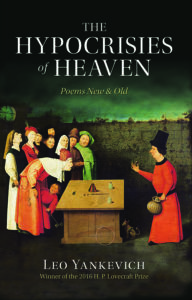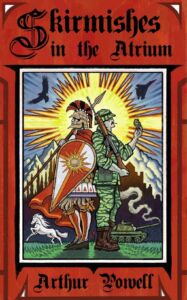Poetry for the Age of Strife: Arthur Powell’s Skirmishes in the Atrium
Skirmishes in the Atrium is a new collection of poems written by Arthur Powell. Tucked inside the pages of poetry are also four essays: “Poetry as Common Folklore,” “Why Poetry Should Matter to Right Wing Dissidents,” “Stop with the Kipling,” and “Art and a Secular Soul?” The essays present compelling food for thought, particularly “Why Poetry Should Matter” and “Stop with the Kipling.” The decision to include them was a wise one, and their placement alongside the poems was done with evident care and intent.
As for the poems themselves, they are arranged in four thematic categories: Blood, Nature, Energy, and Anger. This collection is, as the poet writes in the dedication, “intended to feed your soul for the battle ahead.” One can easily imagine several of these poems set to the music of heavy metal, which is arguably the music of the “Right.” The poem “Beyond the Gates of Wien” and the opening stanza of “Rhodesia’s Death” recall the metal band Sabaton and their vitalistic songs commemorating great moments of European martial history.

You can buy Leo Yankevich’s poetry volume The Hypocrisies of Heaven here.
If all of that bombast is a bit too much for the reader, Powell calms the waters in the subsequent poems inspired by nature. In the essay “Poetry as Common Folklore,” Powell reminds us that during the First World War, “men in the trenches shared poems with each other, some silly, some sweet, some sombre.” With that in mind, the poems of Nature take on a deeper meaning. In our imagination, we can see a group of soldiers telling each other about their home towns, the landscapes of their provinces, the special places they left behind and hope to return to.
In the section of poems devoted to the theme of Anger, Powell touches upon the political. Like Irish rebel songs, these poems hit like a clenched fist. Take, for example, the final stanzas of “Forgiveness?”:
Is there no pride left here?
No fight or venom
To right the wrongs
To not live in fear?
Hollowed out men of hollowed out places
Suffering Stockholm Syndrome
They wash the feet of all other races
This is the kind of art our age desperately needs. It is a lament, but also an attack on the status quo and our wayward society. With lines such as these, men were inspired to take on empires of injustice. Powell understands that facts might not care about feelings, but feelings trump facts almost every time. We can argue the toss from sunup to sundown, but sometimes what a man really needs is to feel.
Skirmishes in the Atrium is yet another step in the right direction. For some time now, nationalists on the “Right” have ignored the realm of art. This was not always the case; in fact it is a rather recent phenomenon, and thus it should be easy to get the “Right” back on track. Powell does what nationalist artists ought to do: make art that is for us, by us.




